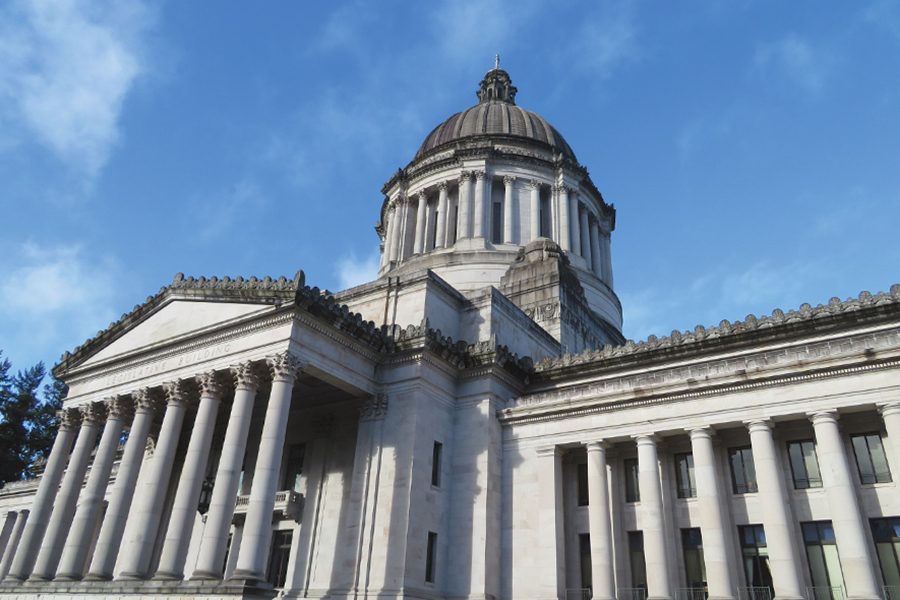
Home » Legislature convenes with new faces and familiar issues
Legislature convenes with new faces and familiar issues

January 12, 2023
The 2023 Washington Legislature convened on Jan. 9 with a slew of new lawmakers and a lengthy list of familiar tasks before its scheduled end date of April 23.
Transportation, energy, building codes, taxation, education and preserving the four Lower Snake River Dams are among the top issues raised by Tri-City leaders. The House and Senate are both controlled by Democrats.
The biggest challenge of the 105-day “long session” is to adopt a budget. Gov. Jay Inslee has proposed a $70.4 billion 2023-25 budget.
The governor’s request includes a few pieces of good news for the Mid-Columbia. The governor is seeking $10 million to establish an energy institute at Washington State University Tri-Cities and $15 million to upgrade the Connell railroad interchange, among other priorities.
The Association of Washington Business called the budget a “starting point,” praising it for not raising taxes but complaining that it drains reserves at a time the state should be saving for a potential recession.
“After years of strong budget growth, it’s time for lawmakers to make do with the considerable resources they have, and to make smart choices that will prepare the state for a possible downturn in the economy,” said Kris Johnson, AWB’s president.
Housing crisis
The housing crisis, which affects the Tri-Cities as much as the rest of the state, is a top priority for both parties and for the governor.
The governor proposes seeking voter approval for a $4 billion project to build more than 24,300 new “housing units” in the next six years.
The Building Industry Association of Washington is asking the Legislature to make energy code reform a key piece of any attempt to address the shortage and to reform the State Building Code Council to emphasize cost-efficient options for new construction.
In November, the State Building Code Council adopted rules requiring heat pumps in new homes built after July 1 of this year. BIAW estimates that adds $8,300 to the price tag, on top of tens of thousands of dollars associated with earlier changes.
Tri-Cities Legislative Council
The Tri-Cities Legislative Council is the community’s lead advocate in Olympia.
This year, it is led by Visit Tri-Cities. Members include the Tri-City Area Chamber of Commerce, the Pasco Chamber of Commerce, the West Richland Chamber of Commerce, the Pasco Hispanic Chamber of Commerce and the Tri-City Development Council, or TRIDEC.
The council’s wish list includes funding local transportation projects, preserving the four Snake River Dams as part of a clean energy future, addressing mental health needs and education funding.
“Funding these specific needs in transportation, mental health, energy, and education will support our community’s continued drive for economic strength and vitality,” said Hector Cruz, vice president of Visit Tri-Cities, the region’s tourism promotion agency. “We look forward to representing these priorities to state legislators later this month.”
Roads and infrastructure
The council’s transportation priorities include infrastructure preservation and improving the rural roads that support the $1.6 billion of agriculture cultivated in Benton and Franklin counties.
It seeks tweaks to the new Tax Increment Financing program to ensure it can be used to support road and infrastructure development at Broadmoor in Pasco, Vista Field in Kennewick, the 7,000-acre Lewis & Clark Ranch in West Richland and at Horn Rapids Industrial Park in Richland.
It is also promoting a wide range of funding from local cities and counties to build and upgrade local roads and bridges.
Pasco is seeking $4 million to develop a bike and pedestrian overpass at West Sylvester Street and Highway 395. Kennewick is seeking $16 million for a similar project, which would create a trail system linking it and Richland via a bike and pedestrian bridge across Highway 240 near Columbia Center. Separately, Kennewick is seeking $20 million for its plan to build a new overpass that would carry Georgia Street over Interstate 82.
Other projects in the wish list include funding for transportation projects involving Red Mountain (West Richland), Aaron Drive/Highway 240 (Richland), A Street and Tank Farm Road (Pasco), Badger Corridor (Benton County), George Washington Way (Richland), Columbia Center Boulevard (Kennewick) and railroad updates (Port of Benton).
Snake River Dams, clean energy
The council calls on the state to support the continued operation of the four Lower Snake River Dams and Energy Northwest’s Columbia Generating Station, which produces electricity for the power grid.
The dams and nuclear plant are important to support the state’s increasing reliance on electricity because of the Clean Energy Transformation Act, the Climate Commitment Act, the Low Carbon Fuel Standard and the new rules that limit the use of natural gas in residential and commercial buildings.
“To meet decarbonization requirements it is imperative we maintain our firm and dispatchable clean energy generators,” it said.
The council supports small modular reactors to provide additional power sources, regulatory review to minimize cost and conflict, expedited siting and permitting for new projects and funding for the governor’s proposed Institute for Northwest Energy Futures at WSU Tri-Cities.
Mental health, wellness
The council supports a $2.3 million request from WSU to establish a four-plus-one bachelor’s-plus-master’s degree program in social work at the Tri-Cities campus in Richland.
It also supports funding to help Benton County build a recovery center at the former Kennewick General Hospital and at a separate location in downtown Kennewick. Construction will cost more than $13 million.
It supports allocating $925,000 annually to support two Basic Law Enforcement Academies in the Tri-Cities to expedite training of new police officers, who currently travel to Burien or Spokane for training.
K-12, higher education
The council supports state funding for K-12 and higher education. It is asking the Legislature to restore the Richland School District to the funding formula that predates the 2017 education bill. The move is supported by the three Tri-City school districts.
It also requests $4.4 million to raise salaries at the WSU College of Nursing, where low salaries have contributed to high turnover and affected the ability to produce nurses.
The council said it supports a budget that will direct $1.7 billion in capital to maintain and modernize aging community and technical colleges. Other requests include $157 million to provide 6.5% salary increases for community and technical college employees and $93 million to expand virtual learning.
New faces for the 8th
The 8th District, which covers Kennewick, Richland and parts of Pasco, elected an all-new delegation in November, with the newcomers taking office this month.
Sen. Matt Boehnke, a Kennewick Republican, stepped up from the House after winning the race to succeed his business-friendly predecessor, Sen. Sharon Brown, who did not seek reelection.
In the House, Boehnke built a reputation for supporting manufacturing. He sponsored the Building Economic Strength Through Manufacturing, or BEST Act, with road bipartisan support. The 2021 bill builds a framework for the state to add 300,000 manufacturing jobs and double the number of firms led by women and minorities.
Reps. Stephanie Barnard and April Connor, both Republicans, succeeded Brad Klippert and Boehnke, who both vacated their seats. Klipper left for a failed bid to unseat U.S. Rep. Dan Newhouse, R-Sunnyside.
The delegations representing the 9th and 16th legislative districts are unchanged.
Go to app.leg.wa.gov.
Local News
KEYWORDS january 2023




